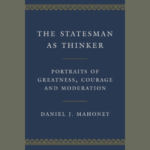W. H. Auden (1901–1973) was one of the handful of great poets writing in English in the twentieth century, but an increasing number of American colleges and universities no longer teach his work. He anchored his poetry in European history and philosophy, mastered and experimented with virtually every technique of traditional prosody, and in middle age embraced Christianity with good humor about how unlikely that embrace looked to many others. These ideological sins usually prevent our English professors from giving Auden his due.
Those professors also tend not to appreciate how important Auden was in his role as a public poet, a role that is extinct in the English-speaking world but survives in other nations. In the pages of the largest newspapers and journals, the release of a book by a public poet constituted a major publishing event that provoked reviews by heavyweight critics and poets, pointed responses to those reviews, and heated debate in and out of academia. Politicians, preachers, and game show hosts quoted their poetry.
The work of public poets, as with public intellectuals, became a part of broader social debates. T. S. Eliot’s work infiltrated public discourse in areas ranging from religion to architecture. Seamus Heaney’s poetry, even when it was seemingly apolitical, mattered in the Northern Ireland political debates of his time. Philip Larkin captured England’s post–World War II malaise in a way that made him a much-quoted celebrity. The poetry of Adrienne Rich became an inspiration within the feminist movement.
Auden’s earliest poems were not promising, but that is true for almost all poets. He caught fire in the early 1930s and for a decade wrote some of the best English poetry since Shakespeare. Examples include his poem for a lost love, “Funeral Blues,” that stole the show of the popular 1994 movie Four Weddings and a Funeral; elegies for Yeats and Freud; overtly political poetry such as “Epitaph for a Tyrant” and “The Unknown Citizen;” and the brooding “September 1, 1939” with the still-controversial edit of the killer last line of its penultimate stanza.
Start your day with Public Discourse
Sign up and get our daily essays sent straight to your inbox.Given the importance of Auden’s work, we should be grateful to Princeton University Press for doing so much to keep it in print and in the public eye, including its recent reissue of Auden’s 1955 book, The Shield of Achilles. Edward Mendelson, the general editor of their series of critical editions of Auden, is a model of thoughtful and fastidious scholarship; readers of this reissue will see his work threaded into this book’s taut and thoughtful notes.
We should also be grateful to Princeton University Press for selecting Alan Jacobs to write the introduction for this reissue. One has to assume that writing about Auden under the supervision of Edward Mendelson would cause a nasty case of anxiety of influence, but Jacobs rose to the challenge. His prose is scholarly, but accessible for a general reader. He gets to the heart of the poems quickly and does a superb job of pointing out connections between the poems in this volume—often connections that I had missed.
Despite the brilliance of Jacobs’s advocacy for The Shield of Achilles, he did not persuade me of this critical assessment:
It is the boldest and most intellectually assured work of his career, an achievement that had not been sufficiently acknowledged, in large part because its poetical techniques are not easily perceived or assessed. It is the most unified of all Auden’s collections[.]
Unlike such poets as Heaney, Wilbur, and Larkin, who to a large extent fine-tuned the same themes and style over decades, Auden was always evolving and experimenting in significant, and sometimes unsuccessful, ways. Some of his experiments, particularly his use of syllabic lines of alternating seven and six syllables, undermined the quality of his poetry. These pairs of lines tended to become in practice a single thirteen-syllable line, a line length that drains energy from one’s words unless a poet can energize it with rhyme or pull off something with echoes of the cadences of the King James Bible, as Walt Whitman did.
Auden’s subject matters changed too. In January of 1939, Auden moved to the United States and later became an American citizen—decisions that provoked enormous criticism in England. Shortly thereafter, he began his relationship with the poet/librettist Chester Kallman, whom he considered his spouse. In September of 1939 England and France declared war on Germany after the latter’s invasion of Poland. In 1940, Auden returned to the Church of England, and in 1941, he began publicly espousing his Christianity.
Auden’s poetry changed as much as his life did, and his poetry was never again as consistently spectacular. In the 1940s he often wrote longer, more rhetorical poems, and those poems were uneven. The poems of The Shield of Achilles are shorter and more experimental in form than the poems of the previous decade, but the unevenness remained. In this period Auden would too often write to amuse himself or a small group of literary insiders, not to rock his broader audience.
At the time of publication, critics split on the quality of the book. The editor of Poetry, Karl Shapiro, published a glowing February 20, 1955 review in the New York Times in which he concluded that “everywhere in the poems we see a master of English poetry, whose stature increases with each new work.” However, the poet and critic Randall Jarrell was gingerly negative in the October 1, 1955 issue of Harper’s Magazine:
A few of the poems are good, and all of them are brilliant, self-indulgent, marvelously individual; if Auden sometimes loses faith in something as frivolous as poetry, he never loses it in something as serious as Auden. Nones was a better book, but this one is worth reading.
On the positive side, the title poem is a classic; it explores the tragedies of World War II, connects them to the Trojan War, and implicitly denounces the epic poetry that traditionally romanticized warfare. His syllabic stanzas flow better with their rhyme, his language has a sparse clarity, and the unexpected simplicity of the close (“Achilles/who would not live long”) is stunning.
The closing section of the book, Horae Canonicae (the Latin term for canonical hours, the schedule for a monastery), is a seven-poem sequence that uses a broader range of poetic techniques than The Shield of Achilles. Its meditations have many of the strengths of the title poem. The first poem, “Prime,” opens with syllabic stanzas, but Auden stretched their length to lines that are not as cramped as those of most of his other syllabic poems. This change gives his verse more momentum, which Auden enhances in these opening lines with his use of alliteration and internal rhyme (vaunt/dawn):
Simultaneously, as soundlessly,
Spontaneously, suddenly
As, at the vaunt of the dawn, the kind
Gates of the body fly open…
Auden is also punning in “Prime” for purpose, not showiness, as he tries to describe the indescribable:
Holy this moment, wholly in the right,
As, in complete obedience
To the light’s laconic outcry, next
As a sheet, near as a wall…
If you listen to these lines being read, you will not be able to distinguish “holy” and “wholly”—and the trick here is that it doesn’t matter; they are interchangeable. The word “right,” which could be interpreted at least two ways, is also interchangeable with its homonym “rite,” so that the ambiguities of this line enhance its meanings in ways unseen since the metaphysical poets three centuries earlier. Similarly, the magical phrase “light’s laconic outcry” defies easy analysis, but somehow it captures mystical feelings.
Regrettably, not all the poems of The Shield of Achilles soar to this level. The book strives for some symmetry by opening and closing with a seven-poem sequence, but “Bucolics,” the opening sequence, is nowhere near as successful as Horae Canonicae. Bad wordplay about Christianity (“First Dad” as a nickname for God) foreshadows these horrid lines about the crucifixion (with a little Descartes thrown in for fun to make the poem even weirder):
That Pliocene Friday when,
At His holy insufflation
(Had he picked a teleost
Or an Anthropod to inspire,
Would our death also have come?)
Our bubble-brained creature said—
“I am loved, therefore I am”—:
And well by now might the lions
Be lying down with the kids,
Had he stuck to that logic.
These lines illustrate a few of Auden’s worst tendencies: obscurity, self-indulgence, and indecision about whether to be comic or serious. The book also includes a cat poem that is at least short, the regrettably long “Ode to Gaea,” and too many allusions certain to send English professors scampering to Wikipedia.
Despite Professor Jacobs’s forceful defense of this book, my opinion remains unchanged. Buy Auden’s Collected Poems, regularly visit his poems from the 1930s, then patiently scour the rest of his work for more gold.
Image by mizar_21984 and licensed via Adobe Stock.














